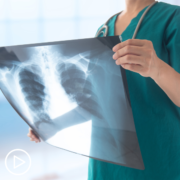Building on Lung Cancer Successes for Targetable Oncogenic Drivers
Building on Lung Cancer Successes for Targetable Oncogenic Drivers from Patient Empowerment Network on Vimeo.
How can recent lung cancer successes be built upon? Experts Dr. Lyudmila Bazhenova and Dr. Jessica Bauman explain advances in lung cancer testing and how targeting of oncogenic drivers can impact patient care.
See More from Lung Cancer | Empowering Providers to Empower Patients
Related Resources:

How Can Lung Cancer Experts in Academic and Community Settings Collaborate |

|

|
Transcript:
Dr. Nicole Rochester:
So I’d love for the two of you to talk about some of the successes in testing over the past decade for lung cancer patients. And we’ll start with you this time, Dr. Bazhenova.
Dr. Lyudmila Bazhenova:
I think our successes actually became our challenges. We have seen an explosion of targetable oncogenic drivers. If you look at the FDA approvals for oncogenic driven therapy, we have a first approval in 2004 and then there was kind of a silence for almost a decade. And then starting in 2014, every year we now have three or four drugs approved. And also those drugs are being approved for the same indication, but different companies. So I think it is very hard for a practicing oncologist who have diseases other than lung cancer to actually keep up with exploding information that they need to know. And I think that’s why I say our success is our challenge, our success is that we are now in lung cancer have 10 oncogenic drivers that we have treatment for.
Our challenge is to remember that there are 10 oncogenic drivers. It’s becoming even more complicated because if you take, for example, an EGFR story, we don’t just need to know that the patient has an EGFR mutation. We need to know what type of EGFR mutation we have, that patient has. And it is no longer three categories. Like even looking in atypical mutations, we now separate out so-called pack mutations, which are treated differently than anything else. So it’s difficult for a practicing physician, or mid level-level practitioner to remember what even to do for lung cancer, but they have to do a breast cancer and colon cancer and everything else. So it is a challenge currently.
Dr. Nicole Rochester:
I appreciate you highlighting that. A lot of times it’s like a double-edged sword, right? What are your thoughts, Dr. Bauman, and in terms of the successes as well as some of the challenges?
Dr. Jessica Bauman:
So I absolutely echo what Dr. Bazhenova is saying in terms of the amazing successes, right? We now have for multiple different populations, we have an oral medication that can treat their cancer with the hope that it keeps that cancer under control for many, many months and for some people even years. And I think the challenge is absolutely keeping track of all of those different mutations and then what is actually targetable. And if you have, is it a mutation? Is it a fusion? Is it… What exactly is it that allows you to then use that targetable therapy? Is certainly one challenge. The other challenge is getting that information as soon as we can get it. So you can imagine, so somebody comes in to see me with a new diagnosis of metastatic lung cancer, right? Their biopsy was done say two weeks at a different hospital, and their first scan was done six weeks ago.
So now they’re already six weeks into the concern of a diagnosis of lung cancer, and they’re symptomatic and they come to see me and say, what am I going to do? And we have to get all of that information as fast as we can, because it completely changes the way we’re going to treat them. And so creating systems, in particular reflex testing systems such that this is sent immediately so that by the time they’re seeing me we already have this information is really important. But that, I think that is sort of at its infancy. At Fox Chase, we’ve worked on our sort of reflex system for a very long time. And it’s still, every time there’s a new approval, it seems like it changes slightly or there’s a new system that we have to think about it. But at the end of the day we also…one of the challenges is making sure that we streamline the processes in which we get this information in the best way we can because tissue can be limited.
There is a lot, making sure that you actually get adequate tissue sampling to be able to test for everything that you need to test for is really important. Then figuring out where to send the testing. Many academic centers have internal panels that they send for molecular testing, but there are so many different companies that advertise doing some kind of molecular testing. And so knowing which of those companies to consider using, what they’re offering, which ones offer RNA sequencing, for example, because that is a particularly important aspect, in addition to DNA sequencing that we need. And so sort of keeping track of all of that is particularly challenging. And then I think the last thing is, I think it’s the needing this information earlier and earlier in a diagnosis.
And so once upon a time, it really was the medical oncologist who could drive this and run the show because it was really, we needed it for somebody with metastatic disease, right? And we’re sort of the captains of the ship per se, when someone has a new diagnosis of metastatic disease. However, now there’s adjuvant therapy for patients who have EGFR mutations after a surgical resection. And so we need, the surgeons also need to really understand that we need this information. And they often are now getting these tests before a medical oncologist even sees the patients. And so it isn’t just medical oncology, it’s also now, it’s going into multiple different specialties who also need to understand what these mutations mean and what to do about them, and then how it influences therapies.



